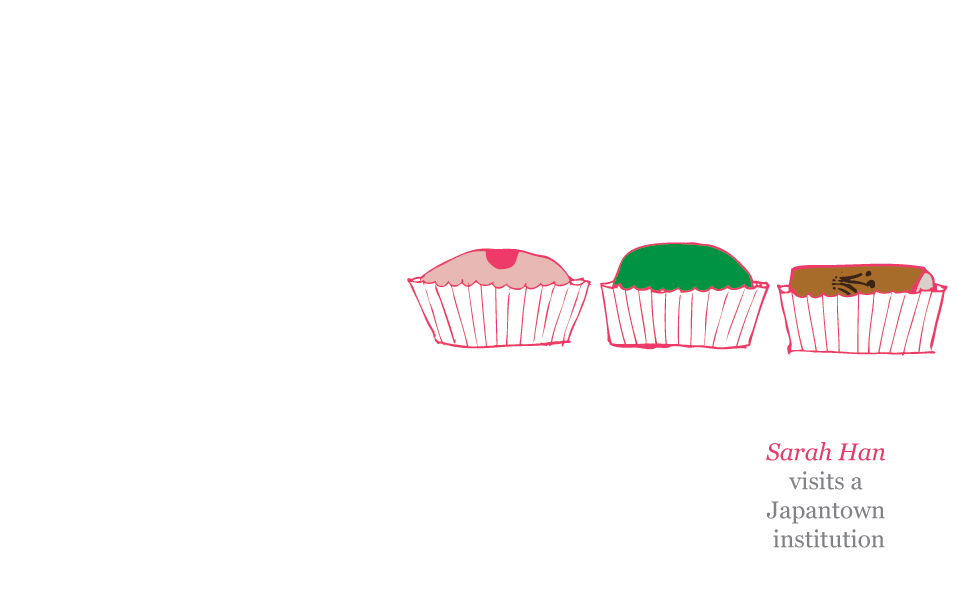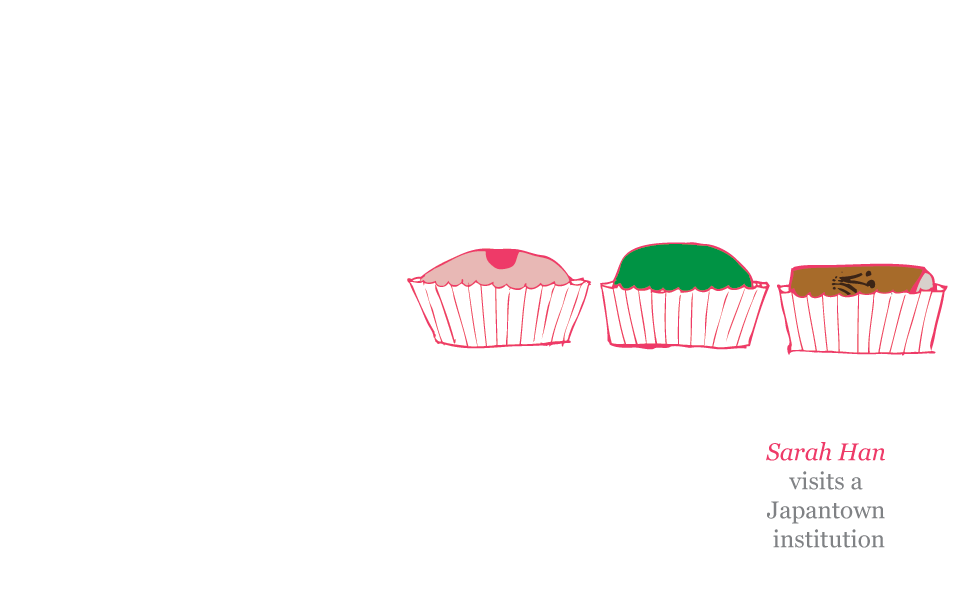
By Sarah Han
Sometimes a TV show theme song best sums up a situation. When a friend of mine got caught smoking at boarding school, her punishment included writing a letter to her parents about the incident. Her mom was deeply touched by her poignant words, that is until she discovered years later that the letter was composed of the lyrics of the “Facts of Life” theme song.
I thought about my friend and her letter when I sat down to write this backstory about Benkyodo Company, a Japanese confectionary/coffee shop in Japantown, because the most fitting words for this story might be the lyrics of the song from “Cheers.”
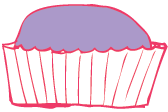
Trade Secrets
Benkyodo is an institution in Japantown, not unlike the titular (if imaginary) Cheers bar. It started selling its traditional handmade manju and mochi (confections made with flour, rice powder, or buckwheat, and filled with sweet bean pastes) in 1906 when Suyeichi Okamura opened the shop, originally on Geary Boulevard. The neighborhood had just been established by Japanese immigrants who settled in the yet-undeveloped six block area of the Western Addition — a part of town that was untouched by the great quake and fire that had just rocked the city.
And the area and the business thrived for years. But then World War II happened, and the Okamura family — along with more than 100,000 Japanese Americans living on the Pacific Coast — was relocated to an internment camp. After the war, the shop reopened, and in 1959, moved to its current location at the corner of Buchanan and Sutter streets.
Today, it’s one of the three remaining oldest family owned and operated Japanese businesses in Japantown (the other two — Soko Hardware and Uoki Sakai Market — are less than a block away) and is the last remaining manufacturer of manju in San Francisco. Suyeichi’s grandsons, Ricky and Bobby Okamura, now run the shop.
Originally, I had contacted the brothers to see if they’d show me how to make their family’s sweets, but they were hesitant to share the secrets of their trade, and said they were too busy to talk to me. I respected their wishes, and decided to visit the shop as a customer. Once there I realized that the manju is only half the story.
More than the confections, the experience of visiting the store is what’s key to this longtime business. It hit me that Benkyodo pretty much epitomizes this ever-evolving neighborhood. It’s a paradoxical mixture of old and new, traditional and pop culture, and Japanese and American influences. It also happens to be a hopping meeting grounds for the Japanese American seniors of the community.
Counter Culture
Located on the other side of Osaka Way, the quaintly cobblestoned area across from the iconic Peace Pagoda and Japantown Center, Benkyodo is somewhat off the beaten track. The store sign is in both Kanji and English, but if you didn’t notice it, you might enter Benkyodo and assume it’s an all-American countertop diner. An orange-red formica counter, like one you’d find in an old-time soda fountain, dotted with 12 round vinyl-upholstered stools takes up the right half of the store.
A letter board spells out menu items like ham and “Devil Egg” sandwiches, hamburgers, soda, shakes, and floats. It’s not trying to be a throwback diner, but Benkyodo manages to capture a feeling of nostalgia so much better than Mel’s or any other cheesy imitation of the past; its authenticity is as pervasive and unapologetic as the savory and beefy odor that filled the air — what I’m assuming is the $2.50 chili, also available on the menu.
Benkyodo is a no frills sort of joint. A large sign at the back strongly announces “NO RESTROOM.” And no, you’re not going to find artisan coffee here. Standard drip is made in an industrial coffee maker; you can get your Blue Bottle down the street at the brand new New People cafe. On this right side of the store, you might think you were in Middle America at some old greasy spoon if you didn’t notice that almost everyone around you is of Japanese descent.
But if you were to turn your head to the left side of the store, you’d find yourself staring at the other dead giveaway that you are, indeed, not in Kansas. Sitting neatly lined up on trays behind the glass counters are what defines Benkyodo: their delicate and colorful handmade manju.
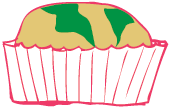
Service with a Bow
On my first visit to Benkyodo, I headed straight for the manju counter. An older Japanese American man with stark white hair was ordering a plate of mochi, and as he waited for his package to be wrapped, I sidled up to him and asked what his favorites were. He completely ignored me. I’m not sure if it’s because he couldn’t hear me, or if he just decided not to be bothered, but I took it as a sign to leave him be.
In any case, I didn’t really need help picking out my batch. I chose six manju, which included domyoji (a pink coarsely ground mochi rice dough filled with smooth red bean and wrapped in a salty and earthy cherry blossom leaf), Age (sugared donut ball with red beans), Kinako (a green mochi dusted with soybean flour and filled with smooth red beans), blueberry mochi, and a chocolate mochi filled with marshmellow and white bean.
When I asked the woman behind the counter if the goods were made fresh every morning, she said “Of course!” as if I were crazy to assume otherwise. She laid my manju on a Styrofoam meat tray and methodically wrapped it in white paper tied with a pink plastic string. She bowed slightly as she handed me my package and told me to be sure to eat my purchases within three days. I got a laugh when I told her not to worry, I planned on eating all of them in one sitting in the next few minutes.
Senior Moments
I ordered a coffee and sat at the one table in the front of the store. While I ate my manju, I took in my surroundings and watched the clientele. A gray-haired woman in a black baseball cap sat at the formica counter and played a game with the middle-aged waitress behind the counter — they were tossing a balled up paper napkin back and forth to each other. It was a strange but touching moment between friends.
Towards the back of the store a couple of old men hunkered together, one of which was my favorite customer — an older Japanese-American man who was probably a looker back in the ’50s. His hair was in style of someone from the era: gray but slicked back in a lazy pomp. Most of the customers knew each other and chatted, sometimes in Japanese, other times in English, and sometimes a mixture of both. At one point co-owner Bobby Okamura appeared from out of the back and made a few jokes with a couple of his favorite long-time customers.
On my second visit to Benkyodo, three of the five customers were ones I saw the week before, including my old man crush and the woman in the black cap. By 3:52 p.m., about an hour before closing time, the place was packed with 13 people. The automatic doorbell chimed every time people entered.
Many customers came in and out of Benkyodo with the sole purpose of buying manju, but most of the regulars sitting around the coffee shop weren’t eating traditional Japanese snacks, instead sipping tea and coffee, eating potato chips, and American style donuts which were sold out of a pink take-out box on the diner top counter. It might seem strange given we were in a traditional Japanese sweet shop, but we were in San Francisco, after all, and not Osaka.
Right before I began to gather my things to finally leave, I saw an aged regular pushing a few bills to the woman behind the diner counter. He shrugged, motioned to the manju counter, and whispered that the money was for the order of manju that the woman at the counter apparently would not take from him.
As I sat and watched the senior social scene over those two afternoons, my mind would involuntarily queue up that “Cheers” theme song, but come to think of it, maybe it should’ve been the one from “Golden Girls” — “Thank You For Being a Friend.”
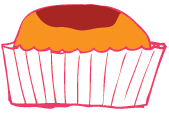
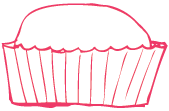
Do It Yourself
Visit Benkyodo to buy a single manju for about a buck each, or buy a plate or box to take home to enjoy. Or hang out, get a cup of coffee, and enjoy the company of the locs. Benkyodo is cash or check only, and is closed on Sundays. Go to their website for their featured manju list and descriptions.
Design by Indhira Rojas



